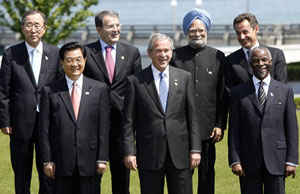FCNNEWSSOURCE
FCN Editorial

In 1885, the ruling European powers met in Germany to regulate colonization and trade in Africa, in what was to be the “New Imperialism” period. It was called The Berlin Conference.
In 1896, the Swedish chemist Svante Arrhenius put forward theories which were discussed at another German summit that year. They linked the phenomena of the seas, the atmosphere, and the land with a climate model which related the influence of atmospheric carbon dioxide on global temperature change–the so-called “Greenhouse Effect,” or what is now called “global warming.”
There have been numerous summit meetings in Germany since then, including the latest in the city of Heiligendamm in early June 2007 among the European powers: France, Germany, Italy, and the United Kingdom, with the United States, Canada, Japan, and now Russia added because they are also major industrialized nations. The European powers became first the Group of Seven, and are now the Group of Eight (G-8).
At this year’s meeting, one nation was labeled “the skunk at the garden party,” because of its opposition to the science of global warming, and its opposition to any effective international solution to that rapidly escalating problem. Which country could that have been? You may have only one guess. Answer: The United States.
At this year’s meeting, one head of state was ill and could not attend the session the summit leaders held with African presidents. Which head of state could that have been? You may have only one guess to this question as well. Answer: President George W. Bush.
German Chancellor Angela Merkel, who hosted this year’s G-8 summit along with British Prime Minister Tony Blair, who leaves office at the end of June, offered a proposal to address the Greenhouse Effect, the same climate problem which was presented to the world 122 years ago. The proposal asked the participants to schedule a date before 2009 to establish a follow-up agreement to the Kyoto Protocol.
Well, the U.S. government has expressed its complete opposition to all of that kind of talk. Hardly any world observer should be surprised, because it is well known that the United States, the biggest polluter of gasses that provoke the Greenhouse Effect and produce climate change, never even agreed in the first place to ratify the Kyoto Protocol, which will expire in 2012.
This year’s Merkel-Blair proposal was largely revised toward the U.S. position, insisting on voluntary, rather than mandatory targets for these wealthiest of the world’s nations to reduce their greenhouse gas emissions. U.S. partisans called the decision a “diplomatic victory” for the Bush administration.
Other summit participants called their agreement “very great progress and an excellent result.”
But environmentalists called it: “too little.”
At the insistence of President George W. Bush, the leaders said they are committed to “substantial” cuts by 2050 of greenhouse gas emissions, which are caused by the burning of fuels such as gasoline and coal. But the deal has no binding caps, only a pledge to “consider seriously” a 50 percent cut by mid-century.
Greenpeace USA was one of several groups to say the agreement “fails to provide clear targets for how we deal with the threat” of global warming.
Other critics were even more unforgiving. The Center for American Progress, a Washington think tank, called Mr. Bush “the skunk at the garden party” for rejecting the Merkel-Blair targets. The center said the U.S. President’s global warming plan amounts to “more talk, less treatment.”
On Africa, the summit pledged $60 billion in aid to fight AIDS, malaria, and TB. The $60 billion promise remained vague however, spread over “the coming years” without a specific timeframe, and some aid groups said it was additionally diminished because it is money already promised, including the U.S. pledge to contribute half of that amount. British poverty campaigner Bob Geldof called those commitments on Africa “a farce,” “a grotesque failure,” and “a grotesque pantomime.”
“Extreme poverty and climate change are the cardinal issues facing us. If we do not resolve them, the rest of this century will see a fairly predictable set of tragedies unfold,” Mr. Geldof wrote in an op-ed article for The Yorkshire Post. The African mainland, he pointed out, at its closest point is just eight miles south of the European continent. “Our neighbors are dying,” he asserts. “What are we going to do about it?”
Then there were tense moments and public exchanges between Pres. Bush and Russian President Vladimir Putin concerning nuclear weapons–and a U.S.-proposed missile defense system to be based in Poland and Czechoslovakia, both former Russian allies/satellites.
During their bi-lateral meeting Presidents Putin and Bush softened their harsh rhetoric. Pres. Putin had threatened to retarget Russian missiles at the European cities where the U.S. radar facility and the missile-defense interceptor-base were to be located. The two men are scheduled to meet face-to-face again in late June at the Bush family estate in Kennebunkport, Maine. For his part, Pres. Putin suggested that the U.S. and Russia might cooperate on a missile shield to be located in Azerbaijan, a former Soviet republic.
And then there were those “pesky” demonstrators who seem to follow Pres. Bush, wherever he appears. Even before the Summit began, protesters demonstrated against the G-8 meeting. In Rostock, located about 15 miles from the German resort of Heiligendamm, there were intense clashes in advance of the sessions, with nearly 1,000 injuries among protesters and police, even though authorities had erected a seven-mile-long barrier, topped with razor-wire to keep the protestors out.
From that first German summit meeting in 1885 when Bismarck, the first Chancellor of Germany, set off the European scramble for Africa–and where there were no public protests–to this meeting, when Ms. Merkel, who is the first female Chancellor of that country, the world’s other richest countries appear now to be unwilling to grapple with their most pressing problems.
We can thank the U.S. and its President in his role as the “Procrastinator-in-Chief,” among others, for the stalemate.












